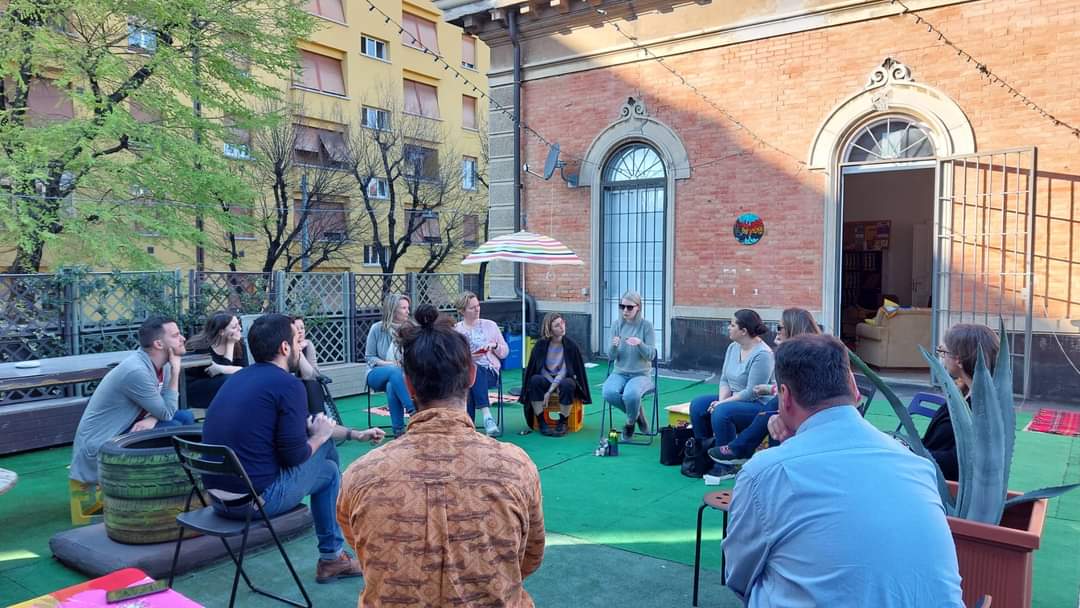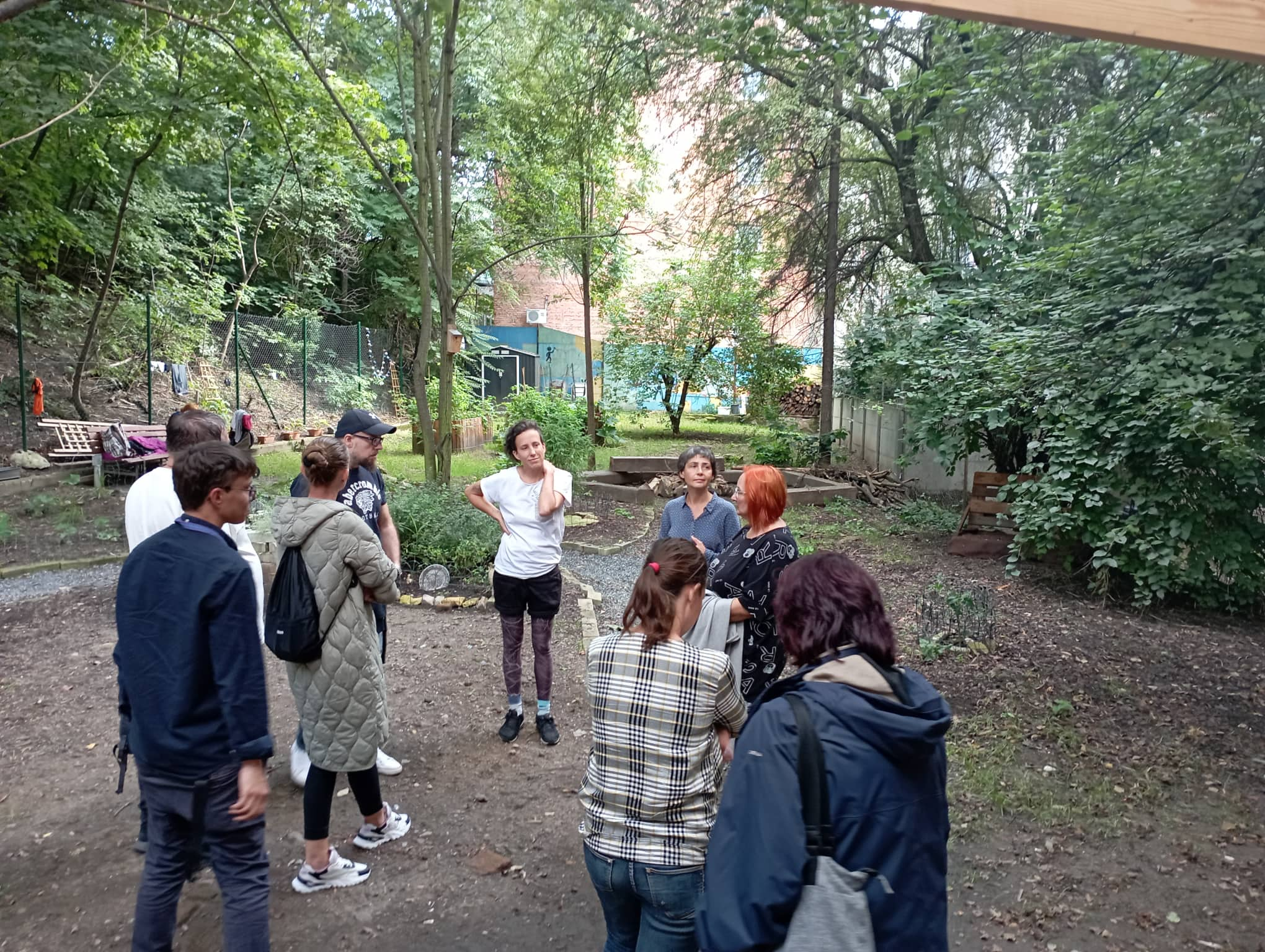
BMSZKI is the capital's largest homeless organisation that has been applying for grants for over 18 years, constantly monitoring international trends. Its long-term development goals are to combat poverty and exclusion. For the present project, they wanted to learn about the work of organisations to find new ideas and adaptable methods for community development, social base-building and support for the disadvantaged or methods of client engagement.
We spoke to Dóra Ujvári-Oláh, project coordinator, about the project results.
Opening to the outside world - new practices in homeless care
What does it mean to you that you were awarded the Erasmus+ Award of Excellence?
It is a huge recognition. It means that the results of our 18 years of professional work, involving international projects, is visible to the outside world and is appreciated by others. It means that even more organisations will be able to spread the word about our projects.
What made the project come to life?
The concrete idea came from our strategic partnership project meeting "Women and homelessness", where our senior professional colleagues participated in a Stockholm. After seeing the project ideas presented at the workshops, they decided that they would form a working group and set up community programmes organising community projects, donations and volunteer work to collect good practices.
"They wanted to set up innovative processes in the institution."
The specific topic was client involvement, community building and client participation, but the available literature on this, within homeless care is very limited in Hungary. Our aim, therefore, was to find a similar organisational structure, but with much more experience. For the colleagues, it is important to see the good practice on the spot at close range, participate in workshops and ask questions from the partner institution's staff.
How easy is it to alter or adapt these good practices to the local system?
The task was made easier by the fact that we were looking for partner organisations with a similar structure, and operation to what we have. We found neighbouring, nearby countries, where the situation is broadly similar: we approached partners in Poland, Slovenia, Austria, Czechia and Italy. We aimed to open up to the world and to communicate better using the good practices concerning our institution and homeless people. I feel that we have achieved our goal.
.jpg)
What activities were carried out during the project?
Originally four study tours were planned, but we managed the grant well, so we ended up with five trips, involving a total of 32 colleagues. Five work visit groups participated in the study tours to homeless care organisations like BMSZKI. Before the trip, the colleagues had already studied the host country, the local homeless services, the activities of the organisation and prepared with specific questions. During their stay, they got to know the organisations, the challenges they face and the successes they have achieved. The professional programme is always busy and hard work, but there is still time for some leisure activities together.
Have your partners learned from you as well?
The Italian organisation was fascinated by the professional support work of our institution and our health unit for homeless people. We are really good at this, and it is very well organised. They invited us to a forthcoming strategic partnership project and they are planning a visit to Budapest. However, several collaborations started during the project, which is very good feedback on our work.

Can you highlight one memorable moment?
There were many. One that I would highlight is when four staff members of Families in Transition travelled to Poland to visit a shelter for mothers to see innovative practice. During the visit, our colleagues were invited for lunch with the mothers living in the shelter. The mothers were very friendly, talked about their lives and asked a lot of questions about how families in our shelters live. It was a very nice moment.
In Bologna, our colleagues were invited to do a radio interview about homeless care in our country and asked questions about the work in prisons. This was also very memorable.
What was the biggest challenge of the project and which result are you most proud of?
"Opening to the outside world" - an approach we already had, but we have made great steps forward with this project. Our colleagues were able to see new practices closely, new knowledge and new ways of looking at things. The aim was to build a kind of partnership between colleagues and homeless people and to provide a better and more dignified service to our clients. There were many good examples of this, and our colleagues brought those home.

But what is tangible, is that during the trip to Ljubljana, we took part in an alternative city walk, led by a former homeless client. Besides the sights of the city, he took the participants to places where he had been before, and which were memorable for him for some reason (where he had washed his clothes or where he had had breakfast). It was a bit different perspective on the city. He received the proceeds from the walk, not the organising company.
It was a great achievement, and we are very proud, that after a long preparatory work, we could do the same walk with the help of one of our clients living in the Transitional Accommodation of Alföld. During the walk, in addition to the local attractions, the participants were able to get to know her life story. As the programme was extremely popular, we would like to continue it in the future.
Another great initiative is also related to the Alföld Street Homeless Transition Shelter, where the staff opened the back garden of the shelter for civilians and residents and organised special community programmes such as a flea-market or a dog adoption day. But for their "This is how we live" programme they also opened the gates of the hostel to the public. On certain days, anyone could go in and see how the homeless live there.
Are there any personal stories that you would like to share?
There are many of them. For example, there was a colleague who had his first flight in his life and it was a great experience for him. The study trips provide a great social experience in addition to professional development. This is why a trip like this is an exceptional way to motivate colleagues and show recognition and appreciation.
|
Applicant institution: Budapest Methodology Social Centre and its Institutions Project title: See and Be Seen: international experiences in community building, client participation and Involvement Coordinator: Dóra Ujvári-Oláh, Erasmus+ Coordinator |
Last modified: 27-08-2024















